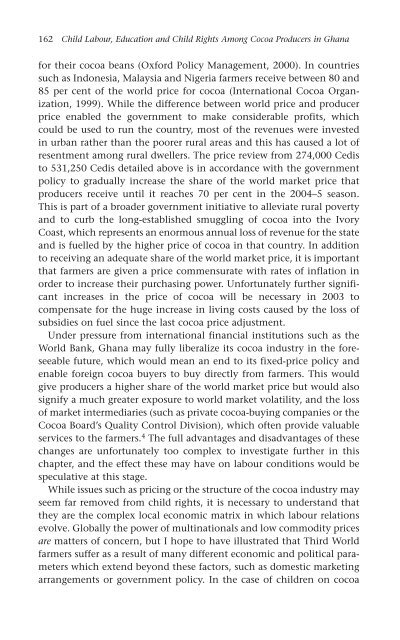3071-The political economy of new slavery
3071-The political economy of new slavery
3071-The political economy of new slavery
You also want an ePaper? Increase the reach of your titles
YUMPU automatically turns print PDFs into web optimized ePapers that Google loves.
162 Child Labour, Education and Child Rights Among Cocoa Producers in Ghana<br />
for their cocoa beans (Oxford Policy Management, 2000). In countries<br />
such as Indonesia, Malaysia and Nigeria farmers receive between 80 and<br />
85 per cent <strong>of</strong> the world price for cocoa (International Cocoa Organization,<br />
1999). While the difference between world price and producer<br />
price enabled the government to make considerable pr<strong>of</strong>its, which<br />
could be used to run the country, most <strong>of</strong> the revenues were invested<br />
in urban rather than the poorer rural areas and this has caused a lot <strong>of</strong><br />
resentment among rural dwellers. <strong>The</strong> price review from 274,000 Cedis<br />
to 531,250 Cedis detailed above is in accordance with the government<br />
policy to gradually increase the share <strong>of</strong> the world market price that<br />
producers receive until it reaches 70 per cent in the 2004–5 season.<br />
This is part <strong>of</strong> a broader government initiative to alleviate rural poverty<br />
and to curb the long-established smuggling <strong>of</strong> cocoa into the Ivory<br />
Coast, which represents an enormous annual loss <strong>of</strong> revenue for the state<br />
and is fuelled by the higher price <strong>of</strong> cocoa in that country. In addition<br />
to receiving an adequate share <strong>of</strong> the world market price, it is important<br />
that farmers are given a price commensurate with rates <strong>of</strong> inflation in<br />
order to increase their purchasing power. Unfortunately further significant<br />
increases in the price <strong>of</strong> cocoa will be necessary in 2003 to<br />
compensate for the huge increase in living costs caused by the loss <strong>of</strong><br />
subsidies on fuel since the last cocoa price adjustment.<br />
Under pressure from international financial institutions such as the<br />
World Bank, Ghana may fully liberalize its cocoa industry in the foreseeable<br />
future, which would mean an end to its fixed-price policy and<br />
enable foreign cocoa buyers to buy directly from farmers. This would<br />
give producers a higher share <strong>of</strong> the world market price but would also<br />
signify a much greater exposure to world market volatility, and the loss<br />
<strong>of</strong> market intermediaries (such as private cocoa-buying companies or the<br />
Cocoa Board’s Quality Control Division), which <strong>of</strong>ten provide valuable<br />
services to the farmers. 4 <strong>The</strong> full advantages and disadvantages <strong>of</strong> these<br />
changes are unfortunately too complex to investigate further in this<br />
chapter, and the effect these may have on labour conditions would be<br />
speculative at this stage.<br />
While issues such as pricing or the structure <strong>of</strong> the cocoa industry may<br />
seem far removed from child rights, it is necessary to understand that<br />
they are the complex local economic matrix in which labour relations<br />
evolve. Globally the power <strong>of</strong> multinationals and low commodity prices<br />
are matters <strong>of</strong> concern, but I hope to have illustrated that Third World<br />
farmers suffer as a result <strong>of</strong> many different economic and <strong>political</strong> parameters<br />
which extend beyond these factors, such as domestic marketing<br />
arrangements or government policy. In the case <strong>of</strong> children on cocoa


